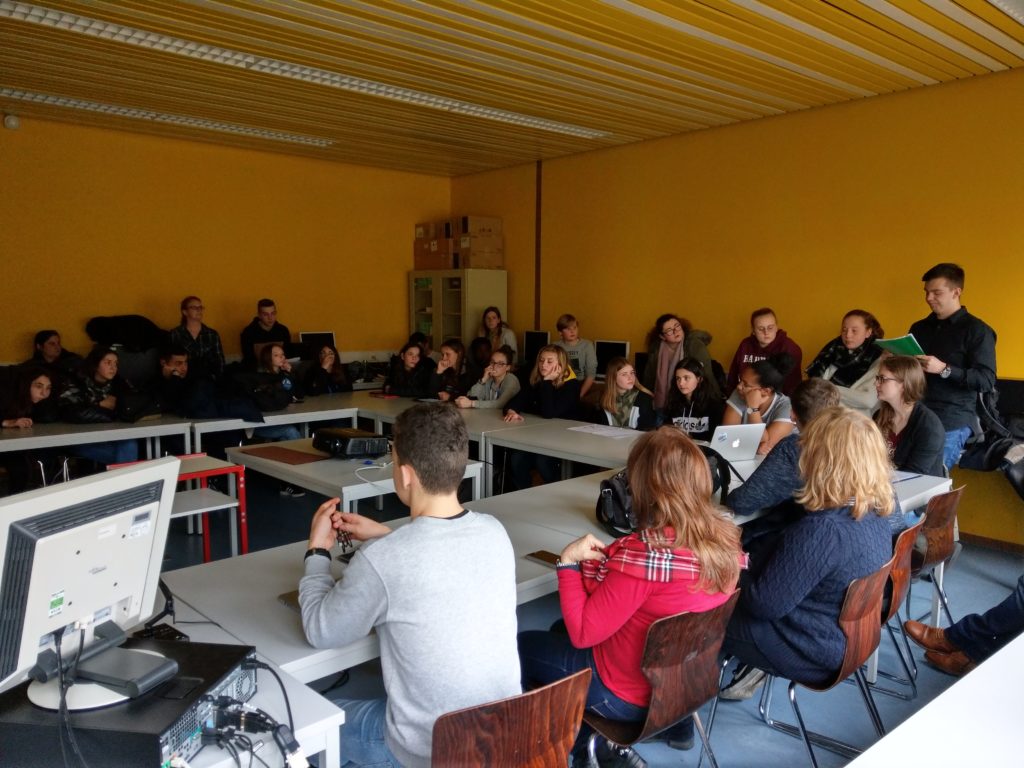In the module “De Facto: Regional Focus on Social Integration Concepts of Local Authorities and Integration Programs in Our Schools“, we looked at local policy strategies in our respective regions. During the module, we tried to find answers to our three guiding questions:
A: How do successful integration concepts in our local communities and in our schools look like?
B: How can we develop our own ideas for successful integration based on the insights we gained?
C: How can other stakeholders in other countries benefit from these flagship projects and our ideas?
At the beginning of the module, we focused on the first question and informed ourselves about different local policies and policy-supported projects for the integration of refugees. To analyze the respective region’s overall efforts in trying to integrate refugees/ immigrants we informed us about the current state of the individual local programs (facts, statistics, conditions, ideas and goals as well as management structures) of each country.
The selected projects and measures focus on different aspects of successful integration, such as language, housing, labor market integration, financial support. We analyzed not only the challenges of integration processes, but also the problems faced by the projects themselves, such as bureaucracy, financial situation, resources.
The results were bundled in explanatory videos and information brochures, which are available in the download area.

The international meeting in Germany
According to our philosophy that
cooperation only turns out to be mutually productive if the one side learns from the other,
we organized the international meeting in Germany.
First, we discussed the approaches of the various integration projects and measures as well as the local situations and conditions of the individual projects to compare the different approaches.
Based on this, we visited different regional integration concepts and projects.
Language Learning Classes
We focused especially the integration concepts in education. In Germany were set up language learning classes for refugees in response to the refugee crisis in 2015 to support the integration process by training them in language skills. To take a closer look at the concept behind this, we discussed with those responsible at the Gymnasium Lehrte. In an interview with the vice principal of the school, we talked about the organization and structure of such classes, as well as problems and challenges that arise in the process, and about teaching German as a second language. This exchange was supported by a German-speaking teacher from SLK. We were able to verify our experiences in everyday life, as we were able to observe these classes during lessons.
General information
Refugees in Germany generally attend a language learning class for one year before being integrated into the German school system. Attendance can be extended to two years as needed. This year, Slk students mainly attend SLK and receive instruction in German, math and English. Sometimes theater is also offered. This is accompanied by a rotation model, so that students attend a regular age-appropriate school class for several hours to encourage integration. SLKs are heterogeneous in terms of age, background and gender. The different educational levels of the students must also be taken into account, as there are big differences in this respect. In admission interviews, students are asked about literacy, their knowledge of math and English, and their previous school career. SLKs are characterized not only by their high degree of heterogeneity, but also by their cooperation and networking. In Lehrte, for example, there is a network of all language learning classes at all schools. The classes are also supported by parents and students who volunteer to help in the classroom.
We also visited the integration management of the city of Hanover for a joint discussion with the head of the department and social workers. We talked about the difficulty refugees encounter and the various approaches to solutions of the city of Hannover. Afterwards, we were able to see integration measures of the city on site and visited the work in Sahlkamp as well as various refugee shelters. On this day, we learned a lot about how the support of refugees looks very concretely in reality and which everyday things can become big challenges.
The cooperation “Vielfalt Innerste”
One particular project we visited, which impressed us with its diverse ideas and cooperation, was “Vielfalt Innerste”. This project is an alliance of various organizations, including Volkswagen, the German Red Cross and a language school, to help refugees in various ways.
In a joint discussion group with the organizers, teachers, volunteers and refugees, we discussed challenges of integration and ways to promote it.
Under the tab “Download” you can find even more materials and results!